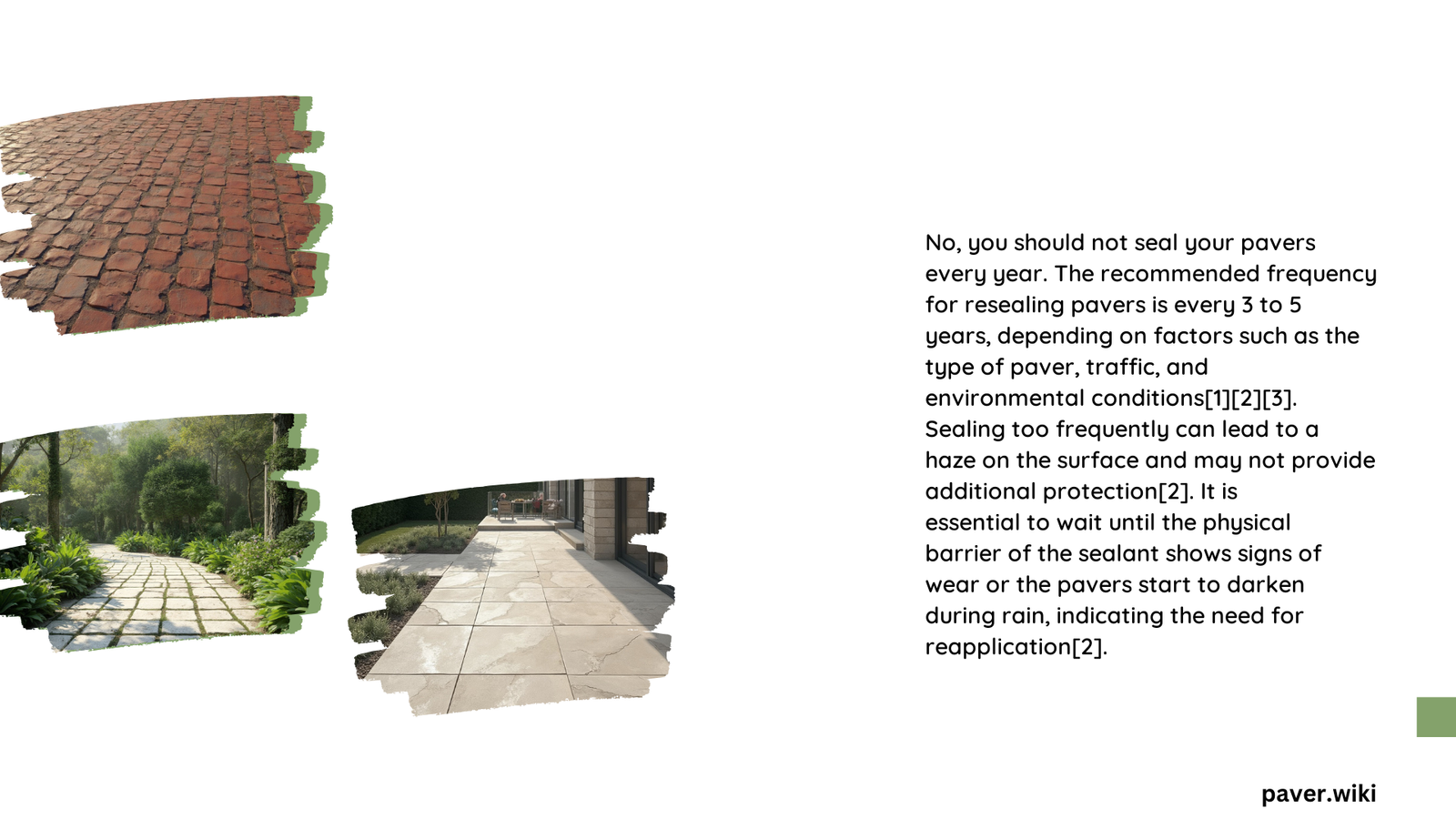Sealing pavers is an essential maintenance task that protects your outdoor surfaces from wear, staining, and environmental damage. The question of whether to seal pavers annually depends on various factors such as climate, usage, and paver material. While annual sealing can provide maximum protection, it may not be necessary for all situations. This article explores the pros and cons of yearly paver sealing and offers guidance on determining the optimal sealing frequency for your specific needs.
What Factors Determine Paver Sealing Frequency?
Several key factors influence how often you should seal your pavers:
- Climate and weather conditions
- Amount of foot or vehicle traffic
- Type of paver material
- Exposure to staining agents
- Desired level of protection
Let’s examine each of these factors in detail.
How Does Climate Affect Sealing Frequency?
Climate plays a crucial role in determining how often you should seal your pavers:
- Harsh Weather: Areas with extreme weather conditions, such as high humidity, frequent rain, or intense UV exposure, may require more frequent sealing. For example, coastal regions or tropical climates might benefit from annual sealing.
- Moderate Climate: In regions with milder weather, sealing every 2-3 years may be sufficient.
- Freeze-Thaw Cycles: Locations that experience frequent freeze-thaw cycles may need more frequent sealing to prevent water infiltration and subsequent damage.
What Role Does Traffic Play in Sealing Frequency?
The amount and type of traffic your pavers experience significantly impact sealing needs:
- High-Traffic Areas: Driveways, walkways, and commercial spaces with heavy foot or vehicle traffic may require annual sealing to maintain their appearance and structural integrity.
- Low-Traffic Areas: Patios, pool decks, or decorative areas with minimal traffic might only need sealing every 2-3 years.
How Does Paver Material Influence Sealing Needs?
Different paver materials have varying porosity levels and sealing requirements:
| Paver Material | Recommended Sealing Frequency |
|---|---|
| Concrete | Every 2-3 years |
| Brick | Every 1-2 years |
| Natural Stone | Every 2-4 years |
What Are the Benefits of Annual Paver Sealing?

While not always necessary, annual sealing offers several advantages:
- Enhanced Protection: Yearly sealing provides maximum defense against stains, UV damage, and erosion.
- Consistent Appearance: Regular sealing maintains the color and finish of your pavers, preventing fading and discoloration.
- Easier Maintenance: Sealed pavers are easier to clean and maintain throughout the year.
- Extended Lifespan: Frequent sealing can extend the life of your pavers by protecting them from wear and environmental damage.
What Are the Drawbacks of Sealing Pavers Every Year?
Despite its benefits, annual sealing may have some disadvantages:
- Cost: More frequent sealing increases maintenance expenses.
- Time and Effort: Annual sealing requires regular time commitment and effort.
- Potential Over-Sealing: In some cases, excessive sealing can lead to a build-up of sealant, affecting the pavers’ appearance or performance.
How Can I Determine If My Pavers Need Sealing?
To assess whether your pavers require sealing, consider the following indicators:
- Water Absorption Test: Sprinkle water on the pavers. If it beads up, the sealant is still effective. If it soaks in quickly, it’s time to reseal.
- Visual Inspection: Look for signs of fading, staining, or erosion.
- Joint Sand Condition: If the sand between pavers is loose or washing away, sealing may be necessary.
- Stain Resistance: Test a small area with a potential staining agent. If it stains easily, resealing is recommended.
What Types of Paver Sealants Are Available?
Understanding different sealant types can help you choose the right product for your needs:
- Penetrating Sealers: These soak into the paver surface, providing protection without changing the appearance.
- Film-Forming Sealers: Create a protective layer on the surface, often enhancing color and providing a glossy finish.
- Water-Based Sealers: Environmentally friendly and easy to apply, but may require more frequent reapplication.
- Solvent-Based Sealers: Offer longer-lasting protection but may have stronger odors and higher VOC content.
How Should I Prepare My Pavers for Sealing?
Proper preparation is crucial for effective sealing:
- Clean the pavers thoroughly using a pressure washer or specialized cleaner.
- Remove any weeds or moss growing between pavers.
- Replace any loose or missing joint sand.
- Allow the pavers to dry completely before sealing (usually 24-48 hours).
What Is the Best Time of Year to Seal Pavers?
Timing your paver sealing can impact its effectiveness:
- Spring or Fall: These seasons often provide ideal conditions with moderate temperatures and lower humidity.
- Avoid Extreme Weather: Don’t seal during very hot, cold, or wet conditions.
- Check Weather Forecast: Ensure several dry days are expected after sealing.
Can I Seal My Pavers Myself or Should I Hire a Professional?
The decision to DIY or hire a professional depends on several factors:
DIY Sealing:
– Pros: Cost-effective, flexible timing
– Cons: Time-consuming, potential for mistakes
Professional Sealing:
– Pros: Expertise, proper equipment, time-saving
– Cons: Higher cost, scheduling constraints
Consider the size of the area, your experience level, and available time when making this decision.
In conclusion, while annual sealing of pavers can provide maximum protection, it’s not always necessary. Assess your specific situation, considering factors like climate, traffic, and paver material to determine the optimal sealing frequency. Regular inspections and maintenance can help you strike the right balance between protection and cost-effectiveness in maintaining your paved surfaces.
References:
1. Patrick’s Paver Sealing
2. Sarasota Sand and Seal
3. Epic Stone Works
4. Paver Sealer Store
5. Seal ‘n Lock
